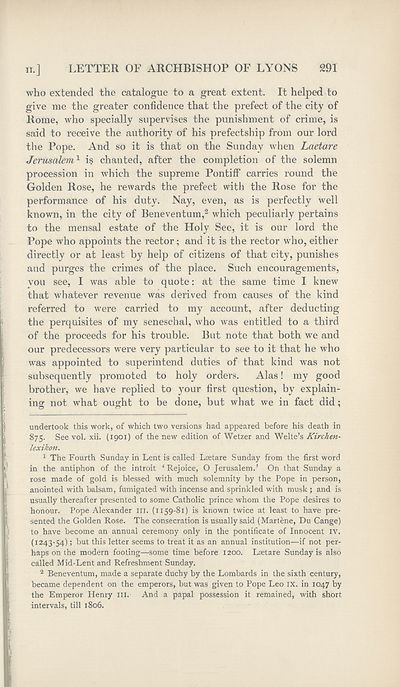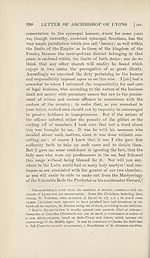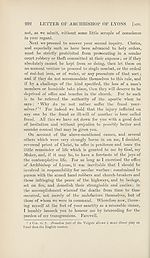Series 1 > Statutes of the Scottish Church, 1225-1559
(412) Page 291
Download files
Complete book:
Individual page:
Thumbnail gallery: Grid view | List view

n.] LETTER OF ARCHBISHOP OF LYONS 291
who extended the catalogue to a great extent. It helped to
give me the greater confidence that the prefect of the city of
Rome, who specially supervises the punishment of crime, is
said to receive the authority of his prefectship from our lord
the Pope. And so it is that on the Sunday when Laetare
Jerusalem1 i§ chanted, after the completion of the solemn
procession in which the supreme Pontiff carries round the
Golden Rose, he rewards the prefect with the Rose for the
performance of his duty. Nay, even, as is perfectly well
known, in the city of Beneventum,2 which peculiarly pertains
to the mensal estate of the Holy See, it is our lord the
Pope who appoints the rector; and it is the rector who, either
directly or at least by help of citizens of that city, punishes
and purges the crimes of the place. Such encouragements,
you see, I was able to quote: at the same time I knew
that whatever revenue was derived from causes of the kind
referred to were carried to my account, after deducting
the perquisites of my seneschal, who was entitled to a third
of the proceeds for his trouble. But note that both we and
our predecessors were very particular to see to it that he who
was appointed to superintend duties of that kind was not
subsequently promoted to holy orders. Alas! my good
brother, we have replied to your first question, by explain¬
ing not what ought to be done, but what we in fact did;
undertook this work, of which two versions had appeared before his death in
875. See vol. xii. (1901) of the new edition of Wetzer and Welte’s Kirchen-
lexikon.
1 The Fourth Sunday in Lent is called Laetare Sunday from the first word
in the antiphon of the introit ‘Rejoice, O Jerusalem.’ On that Sunday a
rose made of gold is blessed with much solemnity by the Pope in person,
anointed with balsam, fumigated with incense and sprinkled with musk ; and is
usually thereafter presented to some Catholic prince whom the Pope desires to
honour. Pope Alexander in. (1159-81) is known twice at least to have pre¬
sented the Golden Rose. The consecration is usually said (Martene, Du Cange)
to have become an annual ceremony only in the pontificate of Innocent IV.
(1243-54); but this letter seems to treat it as an annual institution—if not per¬
haps on the modern footing—some time before 1200. Lsetare Sunday is also
called Mid-Lent and Refreshment Sunday.
2 Beneventum, made a separate duchy by the Lombards in the sixth century,
became dependent on the emperors, but was given to Pope Leo IX. in 1047 by
the Emperor Henry III. And a papal possession it remained, with short
intervals, till 1806.
who extended the catalogue to a great extent. It helped to
give me the greater confidence that the prefect of the city of
Rome, who specially supervises the punishment of crime, is
said to receive the authority of his prefectship from our lord
the Pope. And so it is that on the Sunday when Laetare
Jerusalem1 i§ chanted, after the completion of the solemn
procession in which the supreme Pontiff carries round the
Golden Rose, he rewards the prefect with the Rose for the
performance of his duty. Nay, even, as is perfectly well
known, in the city of Beneventum,2 which peculiarly pertains
to the mensal estate of the Holy See, it is our lord the
Pope who appoints the rector; and it is the rector who, either
directly or at least by help of citizens of that city, punishes
and purges the crimes of the place. Such encouragements,
you see, I was able to quote: at the same time I knew
that whatever revenue was derived from causes of the kind
referred to were carried to my account, after deducting
the perquisites of my seneschal, who was entitled to a third
of the proceeds for his trouble. But note that both we and
our predecessors were very particular to see to it that he who
was appointed to superintend duties of that kind was not
subsequently promoted to holy orders. Alas! my good
brother, we have replied to your first question, by explain¬
ing not what ought to be done, but what we in fact did;
undertook this work, of which two versions had appeared before his death in
875. See vol. xii. (1901) of the new edition of Wetzer and Welte’s Kirchen-
lexikon.
1 The Fourth Sunday in Lent is called Laetare Sunday from the first word
in the antiphon of the introit ‘Rejoice, O Jerusalem.’ On that Sunday a
rose made of gold is blessed with much solemnity by the Pope in person,
anointed with balsam, fumigated with incense and sprinkled with musk ; and is
usually thereafter presented to some Catholic prince whom the Pope desires to
honour. Pope Alexander in. (1159-81) is known twice at least to have pre¬
sented the Golden Rose. The consecration is usually said (Martene, Du Cange)
to have become an annual ceremony only in the pontificate of Innocent IV.
(1243-54); but this letter seems to treat it as an annual institution—if not per¬
haps on the modern footing—some time before 1200. Lsetare Sunday is also
called Mid-Lent and Refreshment Sunday.
2 Beneventum, made a separate duchy by the Lombards in the sixth century,
became dependent on the emperors, but was given to Pope Leo IX. in 1047 by
the Emperor Henry III. And a papal possession it remained, with short
intervals, till 1806.
Set display mode to:
![]() Universal Viewer |
Universal Viewer | ![]() Mirador |
Large image | Transcription
Mirador |
Large image | Transcription
Images and transcriptions on this page, including medium image downloads, may be used under the Creative Commons Attribution 4.0 International Licence unless otherwise stated. ![]()
| Scottish History Society volumes > Series 1 > Statutes of the Scottish Church, 1225-1559 > (412) Page 291 |
|---|
| Permanent URL | https://digital.nls.uk/126921930 |
|---|
| Attribution and copyright: |
|
|---|
| Description | Over 180 volumes, published by the Scottish History Society, containing original sources on Scotland's history and people. With a wide range of subjects, the books collectively cover all periods from the 12th to 20th centuries, and reflect changing trends in Scottish history. Sources are accompanied by scholarly interpretation, references and bibliographies. Volumes are usually published annually, and more digitised volumes will be added as they become available. |
|---|


